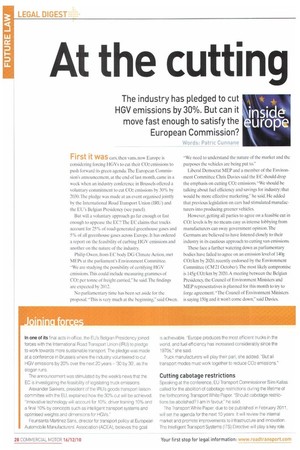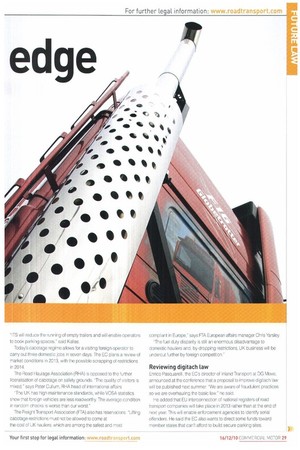At the cutting edge
Page 28

Page 29

If you've noticed an error in this article please click here to report it so we can fix it.
The industry has pledged to cut HGV emissions by 30%. But can it move fast enough to satisfy the European Commission?
Words: Patric Cunnanc First it was cars, then vans, now Europe is considering forcing HGVs to cut their CO2 emissions to push forward its green agenda. The European Commission's announcement, at the end of last month, came in a week when an industry conference in Brussels offered a voluntary commitment to cut CO2 emissions by 30% by 2030. The pledge was made at an event organised jointly by the International Road Transport Union (IRU) and the DJ's Belgian Presidency (see panel).
But will a voluntary approach go far enough or fast enough to appease the EC'? The EC claims that trucks account for 25% of road-generated greenhouse gases and 5% of all greenhouse gases across Europe. It has ordered a report on the feasibility of curbing HGV emissions and another on the nature of the industry.
Philip Owen, from EC body DG Climate Action, met MEN at the parliament's Environment Committee. "We are studying the possibility of certifying HGV emissions This could include measuring grammes of CO2 per tonne of freight carried," he said. The findings arc expected by 2012.
No parliamentary time has been set aside for the proposal. -This is very much at the beginning," said Owen.
"We need to understand the nature of the market and the purposes the vehicles are being put to."
Liberal Democrat MEP and a member of the Environment Committee Chris Davies said the EC should drop the emphasis on cutting COz emissions. "We should be talking about fuel efficiency and savings for industry; that would be more effective marketing," he said. He added that previous legislation on cars had stimulated manufacturers into producing greener vehicles
However, getting all parties to agree on a feasible cut in CO2 levels is by no means easy as intense lobbying from manufacturers can sway government opinion. The Germans are believed to have listened closely to their industry in its cautious approach to cutting van emissions.
These face a further watering down as parliamentary bodies have failed to agree on an emission level of 140g COzikm by 2020, recently endorsed by the Environment Committee (CM 21 October). The most likely compromise is 145g CO2/km by 2020. A meeting between the Belgian Presidency, the Council of Environment Ministers and MEP representatives is planned for this month to try to forge agreement. "The Council of Environment Ministers is saying 150g and it won't come down," said Davies,
























































































































